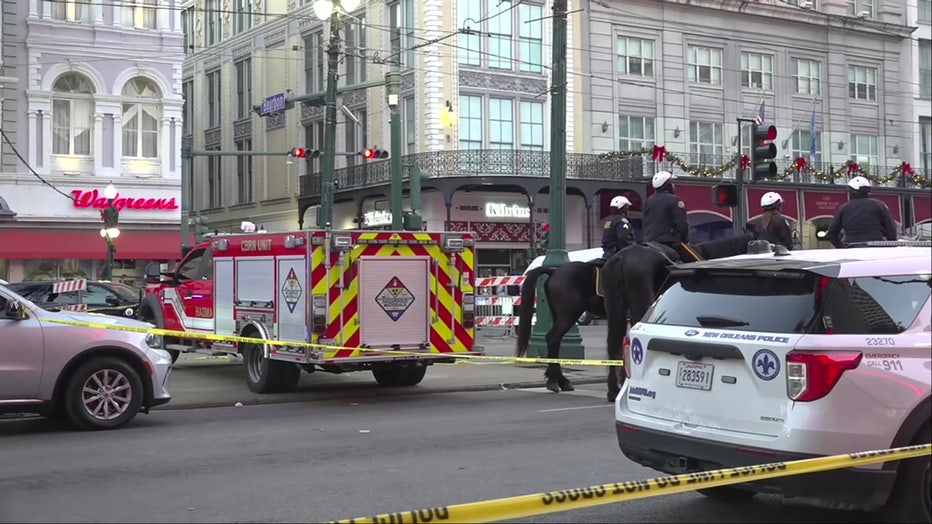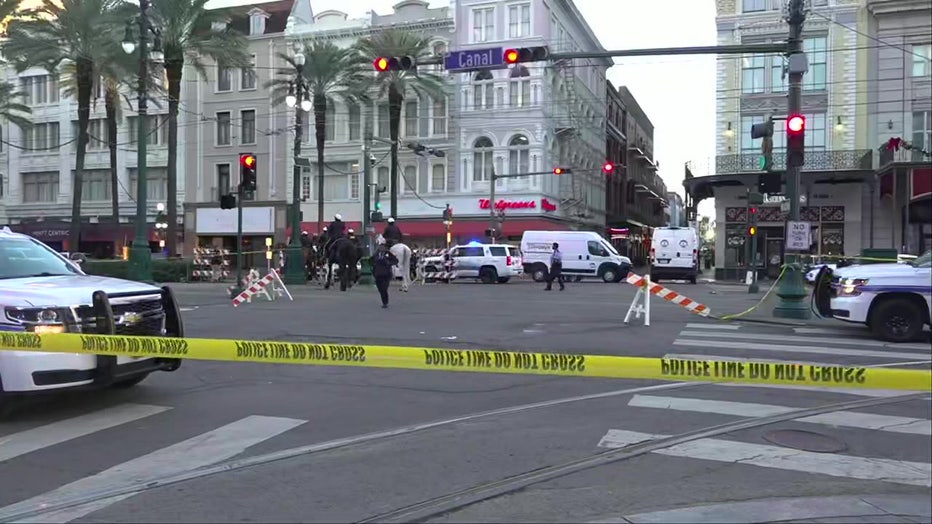Criminologist shares concerns about more attacks following New Orleans and Vegas: ‘Think the unthinkable’

New Orleans terror attack sparks bigger concerns
FOX 13's Genevieve Curtis reports on how experts believe the attacks in New Orleans and Las Vegas on New Year's Day could have wide-reaching effects on safety and could lead to copy-cat attacks in the future.
TAMPA, Fla. - After a devastating attack in New Orleans, a criminal behavior expert is warning about online radicalization and concerns about additional attacks.
Dr. Alex del Carmen is a criminologist in Texas and a Texas A&M regents professor. He said the tragic events in New Orleans aren’t surprising.

The crime scene on Bourbon Street in New Orleans after the terror attack.
"What we are seeing is a quick reminder that international terrorism is still very much present in the United States and that Americans are being radicalized to follow an ideology against our United States," said del Carmen.
READ: New Orleans live updates: Driver plows into Bourbon Street crowd, killing 15
On Dec. 6th, the FBI, Homeland Security, and the National Counterterrorism Center warned local law enforcement about concerns about vehicle ramming during significant outdoor events this holiday season.
Del Carmen also believes there is a connection between the attack in New Orleans and the CyberTruck explosion in Vegas.
"When I look at that, the probability versus the possibility of something happening, you know, in this particular case, there's no way this could be completely isolated from one another," del Carmen said.
Authorities identified 42-year-old Shamsud-Din Jabbar as the suspect in the attack in New Orleans.
Del Carmen says that based on the suspect information, it appears the U.S. citizen, who lived in Houston and served in the Army, was radicalized online.
READ: Tesla Cybertruck explosion outside Trump Las Vegas hotel: 1 dead, several injured
He said investigators will be working to develop a profile of the suspect and his motivations.
"No one is immune from being radicalized, despite the fact that he is homegrown in Texas. That he is someone that, for all purposes, grew up here, joined the military, and served our country, it doesn't necessarily mean that he's immune from being radicalized," said del Carmen.

The crime scene on Bourbon Street in New Orleans after the terror attack.
Del Carmen said it can often begin with someone who has a perceived issue or grievance with the U.S. government and, over time, consumes more propaganda from foreign entities, like terrorist organizations.
"They watch these videos that have been, sadly, presented by foreign entities, which are in some cases doctored or modified to try to show some sort of a reality that doesn't really exist," del Carmen said. "But they believe it. They buy into it."
READ: New Florida laws take effect Jan. 1: Here’s what to know
Del Carmen also fears this could be part of a more significant coordinated attack with other cities at risk.
"Sometimes terrorist threats test out the waters when they're organized, and they would send somebody to do something like what happened this morning," del Carmen said. "Then, you know, two or three days later, they may be a bigger attack because they're trying to study how we respond to it, what the appetite of the American public is related to fighting terrorism."
Del Carmen continued, saying, "We have to think the unthinkable. In my field of criminology, specializing in law enforcement, what we often have to do is imagine the unimaginable."
He says, "The bottom line is, if we continue to assume that the bad guys are going to behave the way we would behave in such a conflict, we are going to fail at this war."
Law enforcement says CyberTruck in Vegas and the truck used in the attack in New Orleans were both rented on the car-sharing app Turo.
The company said in a statement it is working with law enforcement.
STAY CONNECTED WITH FOX 13 TAMPA:
- Download the FOX Local app for your smart TV
- Download FOX Local mobile app: Apple | Android
- Download the FOX 13 News app for breaking news alerts, latest headlines
- Download the SkyTower Radar app
- Sign up for FOX 13’s daily newsletter

